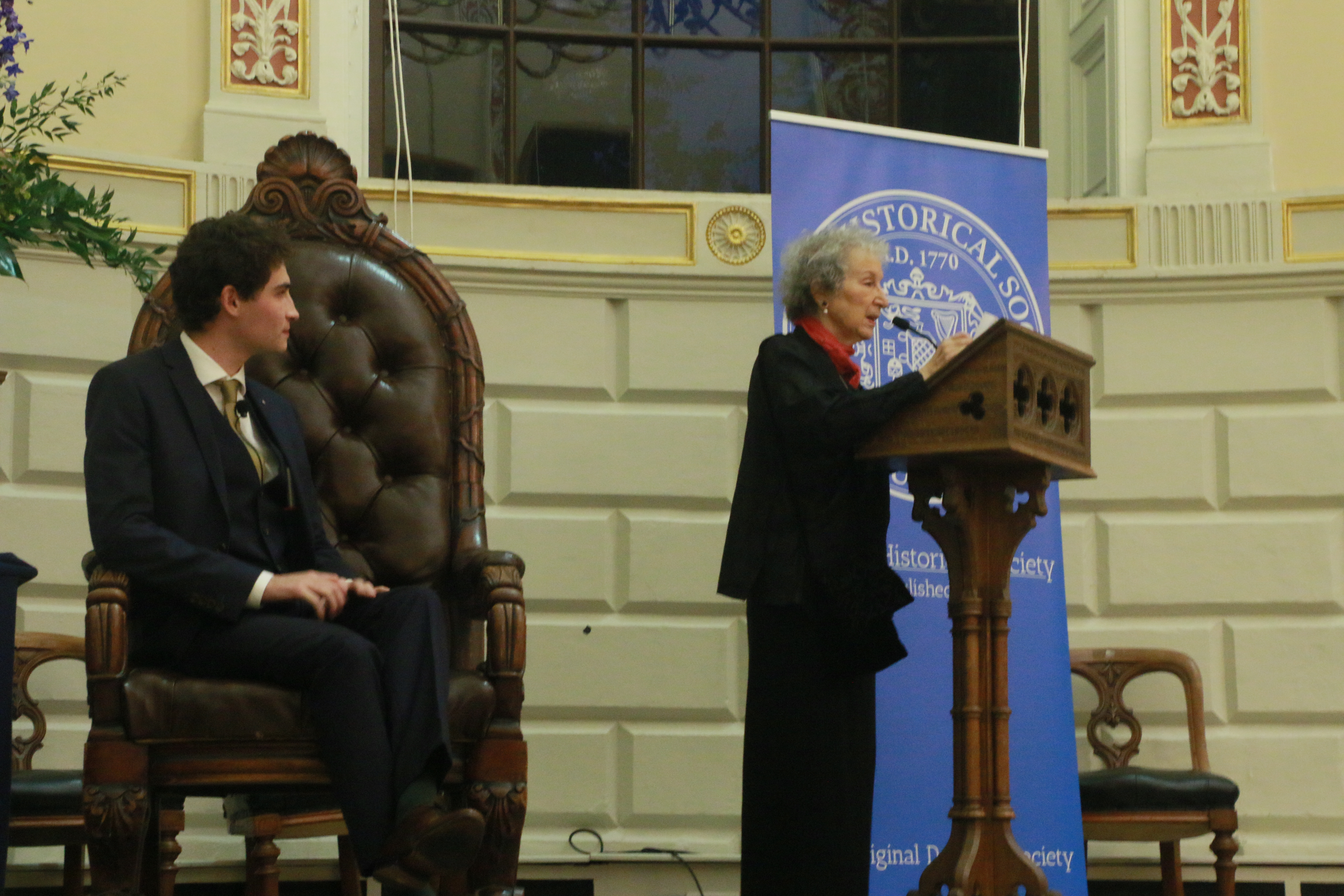What happens when an award-winning Canadian writer and one of Ireland’s foremost feminist activists meet? On Friday evening, the students of Trinity found out, because the Hist welcomed both Margaret Atwood and Ailbhe Smyth for a conversation on the pursuit of truth, literature and social change.
The Hist presented Margaret Atwood, acclaimed author of numerous works – including the 1985 global phenomenon, The Handmaid’s Tale – with the Burke Medal for Outstanding Contribution to Discourse through the Arts. Luke Fehily, Auditor of the Hist, stressed the society’s long association with great literary minds, such as Samuel Beckett, Oscar Wilde, and Oliver Goldsmith.
Both Atwood and Smyth delighted in the society’s basis in debate. Atwood was herself a member of a Toronto-based debating society as an undergraduate. She reflected to the audience that her involvement in debate showed her the necessity of coming to terms with the idea that there would be people in the world whose ideas conflicted with her own. Smyth was also an undergraduate debater and is now widely known for her co-direction of the Together for Yes campaign during the 2018 Irish Abortion Referendum debate. No stranger to the political stage, she depicted her experience of student debate as the coming together of young people to decipher how the world works and how it should work.
Both women stressed the promise of today’s youth in combatting contemporary social issues. A discussion of the longevity of Atwood’s career drew attention to a number of recurrent civic problems which Atwood exposes in her works and their contemporary ramifications. Fehily’s welcome speech foregrounded the critical perception that, today, Atwood’s works stand as warnings. Atwood stressed that her works have gained further mainstream attention in the wake of the rise of the far right. Both Atwood and Smyth expressed the receptiveness of today’s youth to the former’s work.
The women praised the work of the Extinction Rebellion group. Atwood’s response to a submitted question revealed that she sees the climate emergency as the greatest problem facing the world today, and the extent of youth involvement in the group as enabling the possibility of greater reform. Atwood suggested that social change is palpable in today’s world; she has seen numerous examples of economic and corporate reform. She praised Tesco’s proposal to become plastic free. However, she suggests that the world lacks contemporary national reform. She was evidently excited in her discussion of the youth of Extinction Rebellion. She expressed the hope that as huge numbers of people in this group are coming up to voting age, politicians will have to respond to civic and environmental demands in order to maintain their power.
Smyth asked Atwood why she chose to voice her concerns literarily, as opposed to in the direct political forum. Atwood stressed that she is not a natural activist. Atwood opened with a speech purportedly not of wisdom, but of substituted advice, for the younger generation. Wittily she warned her (substantial) audience that ‘An emotion does not justify an action’. She told us anger is a useful tool in raising resistance to injustice, but the dogged pursuit of justice takes time: it is hard work rather than a rash response. It is often discouraging, but it is the only thing that will stop you being angry. Atwood focused on the power of truth. She suggested that truth can be difficult to come by in today’s world, but that if we use our words truthfully, we will be using them ‘powerfully in the best sense’. She reminded the audience that power is morally neutral, but stressed her belief that we would use our future power well.
Atwood suggested that Ireland is currently a shining example of social progress to the world. Smyth tempered Atwood’s praise by reminding the author of the Irish homelessness crisis. However, Smyth’s praise of Atwood’s newly published, The Testaments, and closing encouragement to the audience that they should, if they have not already done so, read The Handmaid’s Tale and the new work attests to a hope which she evidently displayed in the rising generations. Smyth focused on the psychologically enlightening capacity of Atwood’s works which she, herself, had experienced since adolescence, and with which she knew many of the audience were already well acquainted.
Those who are interested in this thought-provoking event, but may have missed the opportunity to attend, can find a recording of the discussion available on the Hist’s YouTube channel.






